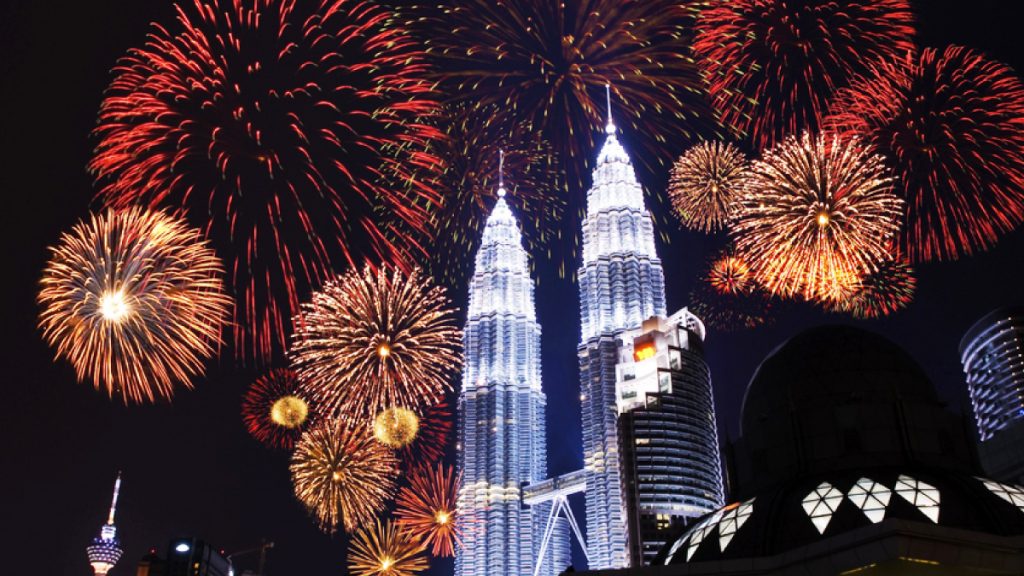New Year’s Day, celebrated on January 1st, marks the beginning of the Gregorian calendar year and is a significant public holiday in Malaysia. This day is filled with a variety of festivities and traditions that reflect the country’s rich cultural diversity. From spectacular fireworks displays in major cities to family gatherings and prayers, Malaysians welcome the new year with joy and unity, making it a day of reflection and new beginnings.
New Year’s Day Dates (2024-2027)
| Year | Date | Day | States Observed |
|---|---|---|---|
| 2024 | January 1 | Monday | Nationwide |
| 2025 | January 1 | Wednesday | Nationwide |
| 2026 | January 1 | Thursday | Nationwide |
| 2027 | January 1 | Friday | Nationwide |
History and Background
The celebration of New Year’s Day has its roots in ancient civilizations, such as the Babylonians, who celebrated the start of the new year over 4,000 years ago. The date of January 1st as New Year’s Day was established by the Roman calendar reform of Julius Caesar in 46 B.C. In Malaysia, the New Year is marked by diverse cultural influences, reflecting the country’s rich tapestry of ethnicities and traditions.
Malaysian Traditions and Cultural Significance
Fireworks and Celebrations
In major cities like Kuala Lumpur and Penang, spectacular fireworks displays light up the night sky as the clock strikes midnight. These displays are often accompanied by concerts, parties, and various entertainment activities. Families and friends gather to celebrate, often indulging in feasts that include a mix of traditional Malaysian dishes and international cuisine.
Reflecting Cultural Diversity
Malaysia’s multicultural society means that New Year’s celebrations incorporate elements from various ethnic groups, including Malay, Chinese, Indian, and indigenous communities. This blend of traditions makes the celebration uniquely Malaysian, showcasing the nation’s unity in diversity.
Prayers and Reflection
For many Malaysians, New Year’s Day is also a time for prayer and reflection. Muslims may offer prayers for a blessed year ahead, while those of other faiths visit temples, churches, and other places of worship to seek blessings.
New Year’s Day Celebrations Across Malaysia
Kuala Lumpur
In the capital city, New Year’s Eve celebrations are particularly grand. Iconic landmarks such as the Petronas Twin Towers and KL Tower are popular spots for viewing fireworks. Streets are often filled with revellers enjoying live music, street performances, and food stalls.
Penang
Penang, known for its vibrant culture and heritage, hosts a variety of events, including cultural performances and street parties. The Esplanade in George Town is a favorite gathering spot for both locals and tourists.
Sabah and Sarawak
In East Malaysia, the states of Sabah and Sarawak offer unique New Year celebrations that reflect their indigenous cultures. Traditional music and dances, such as the sumazau in Sabah and ngajat in Sarawak, are integral parts of the festivities.
Conclusion: Embracing New Beginnings
New Year’s Day in Malaysia is a testament to the country’s rich cultural heritage and its ability to embrace modernity while preserving tradition. As Malaysians usher in the new year, they do so with hope, joy, and a sense of unity that transcends cultural boundaries.
Subtitle: New Year’s Day Traditions: A Malaysian Perspective
New Year’s Day in Malaysia is not just about the start of a new calendar year; it’s a celebration of the country’s cultural diversity. From grand fireworks to intimate family gatherings, Malaysians come together to mark this special day with a blend of traditions that reflect their unique heritage. As we look forward to the upcoming years, the spirit of unity and joy that characterizes New Year’s Day in Malaysia remains a cherished aspect of the nation’s identity.
Frequently Asked Questions (FAQs)
Is New Year’s Day a public holiday in Malaysia?
Yes, New Year’s Day is a public holiday in Malaysia, observed nationwide on January 1st.
How do Malaysians typically celebrate New Year’s Day?
Malaysians celebrate New Year’s Day with fireworks, family gatherings, prayers, and cultural events that reflect the country’s diverse heritage.
Are there any special foods associated with New Year’s Day in Malaysia?
While there are no specific foods exclusively for New Year’s Day, Malaysians often enjoy a variety of traditional dishes from different ethnic cuisines during celebrations.
What are some popular spots to celebrate New Year’s Eve in Malaysia?
Popular spots for New Year’s Eve celebrations in Malaysia include the Petronas Twin Towers and KL Tower in Kuala Lumpur, the Esplanade in Penang, and various cultural sites in Sabah and Sarawak.

